 EDITOR'S PICK
EDITOR'S PICK
Is a Used EV the Best First Car for Teens?
02 Sep 2025 | Synopsis
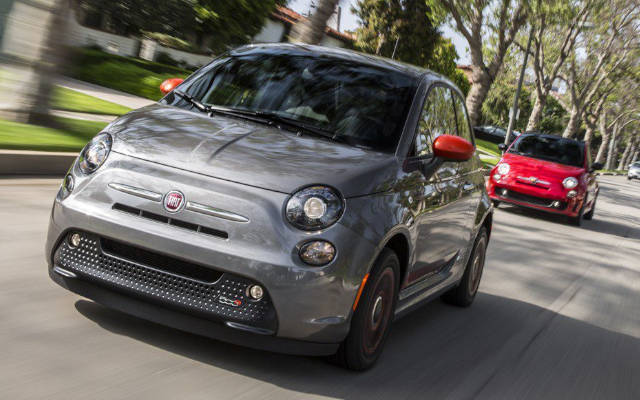 The article recommends used EVs like the Nissan Leaf, Chevy Bolt, and Fiat 500e as smart first cars for teens due to low prices (often under $10K), safety tech, and limited range that keeps teens close to home. These models are widely available, easy to maintain, and offer features like app-based tracking. Overall, they're practical, budget-friendly choices for new drivers, but also check with your insurer since EVs can have higher premiums.
The article recommends used EVs like the Nissan Leaf, Chevy Bolt, and Fiat 500e as smart first cars for teens due to low prices (often under $10K), safety tech, and limited range that keeps teens close to home. These models are widely available, easy to maintain, and offer features like app-based tracking. Overall, they're practical, budget-friendly choices for new drivers, but also check with your insurer since EVs can have higher premiums.Hydrogen Sets Sail for Zero-Emission Shipping in the Netherlands
01 Sep 2025 | Synopsis
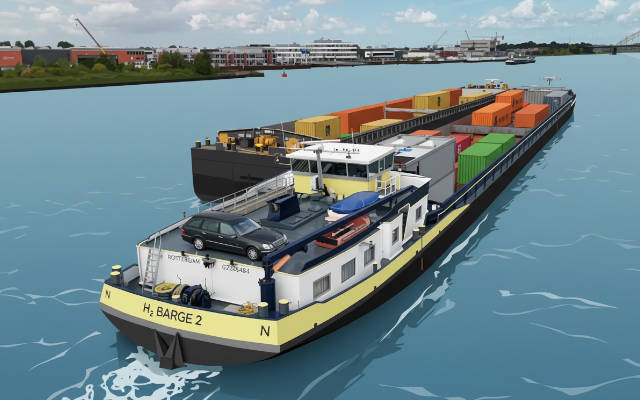 Hydrogen-powered inland vessels have begun operating in the Netherlands, notably the H2 Barge 2 retrofitted with fuel-cell and electric propulsion. Operating between Rotterdam and inland terminals, it completes ~100 round trips yearly, cutting about 2,000 tonnes of CO₂ per year. Funded under the EU's Zero Emission Ports North Sea (ZEM Ports) project, the initiative highlights hydrogen's promise for clean maritime transport - but widespread adoption still faces cost and incentive obstacles.
Hydrogen-powered inland vessels have begun operating in the Netherlands, notably the H2 Barge 2 retrofitted with fuel-cell and electric propulsion. Operating between Rotterdam and inland terminals, it completes ~100 round trips yearly, cutting about 2,000 tonnes of CO₂ per year. Funded under the EU's Zero Emission Ports North Sea (ZEM Ports) project, the initiative highlights hydrogen's promise for clean maritime transport - but widespread adoption still faces cost and incentive obstacles.India is Building a Strong EV Ecosystem While the World Only Sees Tesla & BYD
01 Sep 2025 | Synopsis
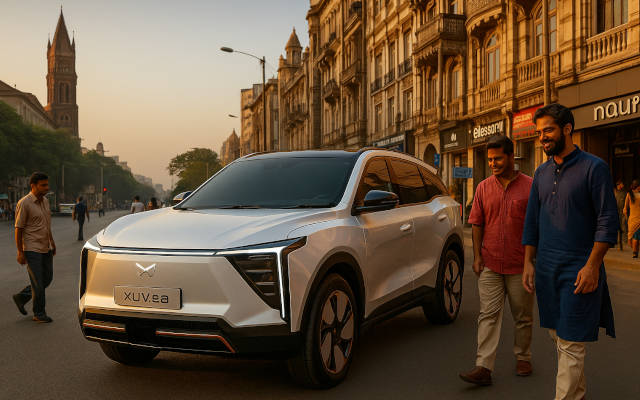 India's EV sector is rapidly evolving beyond headline makers like Tesla and BYD, developing a homegrown ecosystem. Local startups and incumbents are advancing battery tech, charging networks, and deep-tech innovation. Government support -including FAME II, PLI schemes, and customs exemptions - is boosting domestic manufacturing, startups, and infrastructure. While global attention lingers on foreign brands, India's EV ecosystem is quietly maturing with scale and resilience.
India's EV sector is rapidly evolving beyond headline makers like Tesla and BYD, developing a homegrown ecosystem. Local startups and incumbents are advancing battery tech, charging networks, and deep-tech innovation. Government support -including FAME II, PLI schemes, and customs exemptions - is boosting domestic manufacturing, startups, and infrastructure. While global attention lingers on foreign brands, India's EV ecosystem is quietly maturing with scale and resilience.The Coming Ecological Cold War
01 Sep 2025 | Synopsis
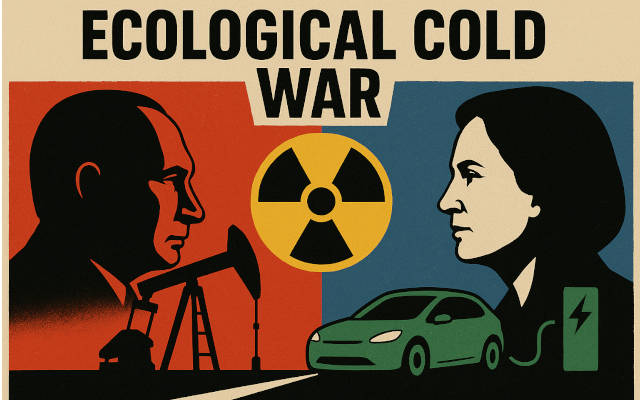 The energy transition is more than tech or economics—it’s reshaping geopolitics. IEA's "Net Zero by 2050" imposes an all-out electrification, doubling electricity, zero-carbon, renewables, EV share leaps, industrial & building overhaul by 2050. This sparks an eco-ideological Cold War: a Sino-European green entente vs an axis of petrostates (U.S., Russia, Saudi Arabia) resisting decarbonization
The energy transition is more than tech or economics—it’s reshaping geopolitics. IEA's "Net Zero by 2050" imposes an all-out electrification, doubling electricity, zero-carbon, renewables, EV share leaps, industrial & building overhaul by 2050. This sparks an eco-ideological Cold War: a Sino-European green entente vs an axis of petrostates (U.S., Russia, Saudi Arabia) resisting decarbonizationThe Dutch Blueprint: Infrastructure Supercharges EV Adoption
01 Sep 2025 | Synopsis
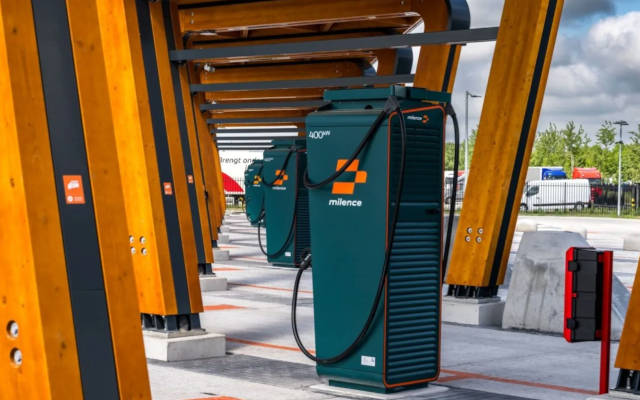 The Netherlands leans on its robust EV charging infrastructure rather than incentives alone: with 10.04 charge points per 1,000 people and over 157,000 outlets, it's Europe's densest network - even as the country ranks fourth in EV market share (~35%). Policymakers banned fossil-fuel vehicle sales by 2030 and are phasing down subsidies. Challenges now include rising charging costs - up 13% overall and 25% in Amsterdam.
The Netherlands leans on its robust EV charging infrastructure rather than incentives alone: with 10.04 charge points per 1,000 people and over 157,000 outlets, it's Europe's densest network - even as the country ranks fourth in EV market share (~35%). Policymakers banned fossil-fuel vehicle sales by 2030 and are phasing down subsidies. Challenges now include rising charging costs - up 13% overall and 25% in Amsterdam.
 Si Exclusive
Si Exclusive
Rivian's Infotainment Revolution: AI at the Wheel, No Smartphone Required
11 Oct 2025 |  Rivian's infotainment system replaces CarPlay with a native AI-powered interface backed by Amazon and Volkswagen. It offers smart navigation, voice control, music/video streaming, and cloud-based personalization. AM radio is excluded, prompting bipartisan legislation to mandate its return. Autonomous driving integration is planned, with updates rolling out in 2025 and full features expected in the R2 by 2026.
Rivian's infotainment system replaces CarPlay with a native AI-powered interface backed by Amazon and Volkswagen. It offers smart navigation, voice control, music/video streaming, and cloud-based personalization. AM radio is excluded, prompting bipartisan legislation to mandate its return. Autonomous driving integration is planned, with updates rolling out in 2025 and full features expected in the R2 by 2026.
Hydrogen's Flight Path: Fuel Cells, Turbines, and the Economics of Clean Aviation
10 Oct 2025 |  Aviation is shifting from Jet A to four fuel systems: electricity, hydrogen (fuel cell and combustion), SAF, and petroleum. Fuel cells suit short-haul aircraft; hydrogen combustion may power long-range jets. SAF bridges legacy fleets. Hydrogen costs - $5-$7/kg today, possibly $2/kg by 2040 - impact ticket prices and infrastructure decisions. Airport authorities, airlines, and governments will share deployment costs. Each fuel has distinct environmental pros and cons shaping aviation's net-zero future.
Aviation is shifting from Jet A to four fuel systems: electricity, hydrogen (fuel cell and combustion), SAF, and petroleum. Fuel cells suit short-haul aircraft; hydrogen combustion may power long-range jets. SAF bridges legacy fleets. Hydrogen costs - $5-$7/kg today, possibly $2/kg by 2040 - impact ticket prices and infrastructure decisions. Airport authorities, airlines, and governments will share deployment costs. Each fuel has distinct environmental pros and cons shaping aviation's net-zero future.
Ferrari Elettrica: Electrified, Not Tamed
09 Oct 2025 |  Ferrari's Elettrica EV delivers over 1,000 hp via quad motors, hitting 0-100 km/h in 2.5s with a 330+ mile range. Its 122 kWh battery sits low for balance, paired with active suspension and rear steering. Designed by LoveFrom, the four-door GT aims to preserve Ferrari's emotional DNA. Priced around $580K, it launches in 2026 in Europe and the U.S., with hybrids and ICE models still dominating until 2030
Ferrari's Elettrica EV delivers over 1,000 hp via quad motors, hitting 0-100 km/h in 2.5s with a 330+ mile range. Its 122 kWh battery sits low for balance, paired with active suspension and rear steering. Designed by LoveFrom, the four-door GT aims to preserve Ferrari's emotional DNA. Priced around $580K, it launches in 2026 in Europe and the U.S., with hybrids and ICE models still dominating until 2030
 11 Oct 2025 20:16:01 UTC |
RECENT PODCASTS
BYD Soars - Cheaper Tesla Models - The Bolt is Back - Rivian
SEARCH RSSTREAM
 57 New Postings In Past 24 Hours
57 New Postings In Past 24 Hours
Category:mobility
Region:NoAmerica
Date:11 Oct 2025
Category:energy
Region:Global
Date:11 Oct 2025
Category:policy
Region:NoAmerica
Date:11 Oct 2025
Category:mobility
Region:NoAmerica
Date:11 Oct 2025
Category:finance
Region:NoAmerica
Date:11 Oct 2025
Category:mobility
Region:NoAmerica
Date:11 Oct 2025
Category:mobility
Region:SoAmerica
Date:11 Oct 2025
Category:finance
Region:SoAmerica
Date:11 Oct 2025
Category:mobility
Region:AsiaPacific
Date:11 Oct 2025
Category:finance
Region:AsiaPacific
Date:11 Oct 2025
Category:finance
Region:AsiaPacific
Date:11 Oct 2025
Category:mobility
Region:AsiaPacific
Date:11 Oct 2025
Category:mobility
Region:Global
Date:11 Oct 2025
Category:policy
Region:NoAmerica
Date:11 Oct 2025
Category:mobility
Region:Africa
Date:11 Oct 2025